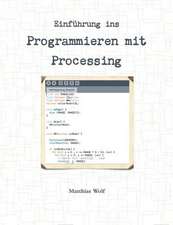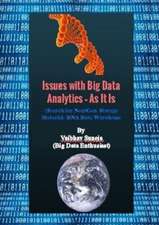Interactive Data Visualization: Foundations, Techniques, and Applications, Second Edition
Autor Matthew O. Ward, Georges Grinstein, Daniel Keimen Limba Engleză Hardback – 10 iun 2015
Interactive Data Visualization: Foundations, Techniques, and Applications, Second Edition provides all the theory, details, and tools necessary to build visualizations and systems involving the visualization of data. In color throughout, it explains basic terminology and concepts, algorithmic and software engineering issues, and commonly used techniques and high-level algorithms. Full source code is provided for completing implementations.
New to the Second Edition
- New related readings, exercises, and programming projects
- Better quality figures and numerous new figures
- New chapter on techniques for time-oriented data
Each chapter presents several types of exercises, including review questions and problems that motivate readers to build on the material covered and design alternate approaches to solving a problem. In addition, programming projects encourage readers to perform a range of tasks, from the simple implementation of algorithms to the extension of algorithms and programming techniques.
Web Resource
A supplementary website includes downloadable software tools and example data sets, enabling hands-on experience with the techniques covered in the text. The site also offers links to useful data repositories and data file formats, an up-to-date listing of software packages and vendors, and instructional tools, such as reading lists, lecture slides, and demonstration programs.
| Toate formatele și edițiile | Preț | Express |
|---|---|---|
| Paperback (1) | 299.27 lei 3-5 săpt. | +67.45 lei 4-10 zile |
| CRC Press – 31 mar 2021 | 299.27 lei 3-5 săpt. | +67.45 lei 4-10 zile |
| Hardback (1) | 606.12 lei 6-8 săpt. | |
| CRC Press – 10 iun 2015 | 606.12 lei 6-8 săpt. |
Preț: 606.12 lei
Preț vechi: 828.02 lei
-27% Nou
Puncte Express: 909
Preț estimativ în valută:
116.02€ • 126.06$ • 97.52£
116.02€ • 126.06$ • 97.52£
Carte tipărită la comandă
Livrare economică 21 aprilie-05 mai
Preluare comenzi: 021 569.72.76
Specificații
ISBN-13: 9781482257373
ISBN-10: 1482257378
Pagini: 578
Ilustrații: 302 colour illustrations, 11 black & white tables
Dimensiuni: 191 x 235 x 23 mm
Greutate: 1.36 kg
Ediția:Revised
Editura: CRC Press
Colecția A K Peters/CRC Press
ISBN-10: 1482257378
Pagini: 578
Ilustrații: 302 colour illustrations, 11 black & white tables
Dimensiuni: 191 x 235 x 23 mm
Greutate: 1.36 kg
Ediția:Revised
Editura: CRC Press
Colecția A K Peters/CRC Press
Public țintă
Academic and Professional Practice & DevelopmentCuprins
Introduction. Data Foundations. Human Perception and Information Processing. Visualization Foundations. Visualization Techniques for Spatial Data. Visualization Techniques for Geospatial Data. Visualization Techniques for Time-Oriented Data. Visualization Techniques for Multivariate Data. Visualization Techniques for Trees, Graphs, and Networks. Text and Document Visualization. Interaction Concepts. Interaction Techniques. Designing Effective Visualizations. Comparing and Evaluating Visualization Techniques. Visualization Systems. Research Directions in Visualization. Appendices. Bibliography. Index.
Recenzii
Praise for the First Edition:
A 2010 CHOICE Outstanding Academic Title
"College-level collections strong in concepts and theory surrounding data visualization will find Interactive Data Visualization: Foundations, Techniques, and Applications to be a powerful addition, covering all the details and tools needed for building visualizations around data. From math and statistical graphs to cartography and scientific displays, this offers plenty of details for creating visual displays of data, offering color illustrations throughout and plenty of refinement details."
—The Midwest Book Review, August 2011
"With chapters on elaborating on the importance of visualization, understanding the data without it, the relation to the human eyes and mind, what technology has brought in the avenues of displaying and interacting data, no concept is really left untouched. Enhanced with example data, samples, a history of computer graphics, and more, Interactive Data Visualization is a solid text to have on hand for any community or college library collection."
—James A. Cox, The Midwest Book Review, August 2010
A 2010 CHOICE Outstanding Academic Title
"College-level collections strong in concepts and theory surrounding data visualization will find Interactive Data Visualization: Foundations, Techniques, and Applications to be a powerful addition, covering all the details and tools needed for building visualizations around data. From math and statistical graphs to cartography and scientific displays, this offers plenty of details for creating visual displays of data, offering color illustrations throughout and plenty of refinement details."
—The Midwest Book Review, August 2011
"With chapters on elaborating on the importance of visualization, understanding the data without it, the relation to the human eyes and mind, what technology has brought in the avenues of displaying and interacting data, no concept is really left untouched. Enhanced with example data, samples, a history of computer graphics, and more, Interactive Data Visualization is a solid text to have on hand for any community or college library collection."
—James A. Cox, The Midwest Book Review, August 2010
Notă biografică
Matthew O. Ward was a professor in the Department of Computer Science at Worcester Polytechnic Institute. Dr. Ward’s research focused on computer graphics, animation, image processing, computer vision, and data and information visualization.
Georges Grinstein is a professor in the Department of Computer Science and director of both the Institute for Visualization and Perception Research and the Center for Biomolecular and Medical Informatics at the University of Massachusetts Lowell. Dr. Grinstein’s research encompasses visual analytics, human computing, perceptual computing, information computing, and visualization systems engineering.
Daniel Keim is a professor in the Department of Computer and Information Science and head of the Data Analysis and Visualization group at the University of Konstanz. Dr. Keim’s research interests include databases, data mining, information visualization, and visual analytics.
Georges Grinstein is a professor in the Department of Computer Science and director of both the Institute for Visualization and Perception Research and the Center for Biomolecular and Medical Informatics at the University of Massachusetts Lowell. Dr. Grinstein’s research encompasses visual analytics, human computing, perceptual computing, information computing, and visualization systems engineering.
Daniel Keim is a professor in the Department of Computer and Information Science and head of the Data Analysis and Visualization group at the University of Konstanz. Dr. Keim’s research interests include databases, data mining, information visualization, and visual analytics.
Descriere
In color throughout, this popular book provides all the theory, details, and tools necessary to build visualizations and systems involving the visualization of data. It explains basic terminology and concepts, algorithmic and software engineering issues, and commonly used techniques and high-level algorithms. Full source code is provided for completing implementations. This edition includes new related readings, exercises, and programming projects; better quality figures and numerous new figures; and a new chapter on techniques for time-oriented data.





























